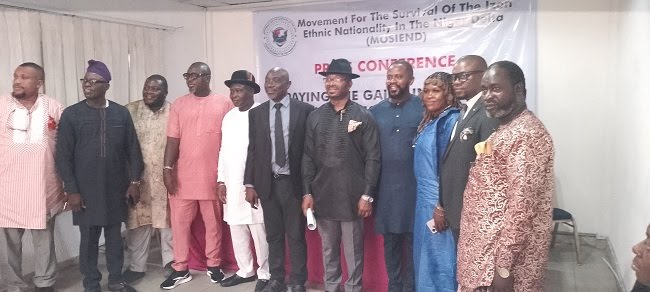PINL contracts to yield productive crude output _ Group tells FG
The Movement for the Survival of the Izon Ethnic Nationality in the Niger Delta (MOSIEND) has urged the Federal Government to continue the pipeline surveillance contract with Pipeline Infrastructure Nigeria Ltd (PINL) due to the company’s impressive performance. MOSIEND noted that PINL’s effective protection of the Trans Niger Pipeline (TNP) has contributed to the recent increase in Nigeria’s crude oil production, which was recently reported by the Nigerian National Petroleum Company Limited (NNPCL).
NNPCL disclosed that, for the first time in over 15 years, the country’s daily crude oil output reached 1.8 million barrels per day, up from about 1.35 million, and natural gas production rose to 7.4 billion standard cubic feet per day, compared to 5.5 billion standard cubic feet.
At a press conference in Port Harcourt, MOSIEND praised the efforts of PINL, the military, and other stakeholders in achieving consistent oil production in the Niger Delta. MOSIEND’s National President, Kennedy West, emphasized the importance of maintaining the contract with PINL, highlighting the company’s community engagement approach. This model, which includes involving community members in monitoring and protecting pipelines, is seen as essential for effective operations.
READ ALSO: Niger delta community accuses oil firm of marginalization, gives ultimatum
West pointed out that there are areas in the creeks that are inaccessible to the military and other outsiders due to traditional practices, but community members and youths can access these locations. He expressed satisfaction with PINL’s operations over the years and urged the Federal Government to maintain the contract to expand the reach of such initiatives.
During the conference, themed ‘X-raying the gains in the fight against illegal bunkering: the surveillance perspective,’ MOSIEND spokesman Charles Omusuku commended PINL for its trust-building efforts, job creation, and corporate social responsibility initiatives, which have transformed communities from passive bystanders into active participants in protecting oil infrastructure. He described PINL’s success as proof of the effectiveness of collaboration among private-sector innovation, community involvement, and government support.
Omusuku highlighted the long-standing issues of pipeline vandalism, oil theft, and illegal bunkering, which have severely impacted the economy, caused significant revenue losses, led to environmental damage, and created insecurity in oil-producing communities. These problems have weakened the foundation of the oil-dependent economy, hampered development, and resulted in environmental and health challenges.
He praised PINL’s use of advanced technology and community engagement for its nearly uninterrupted operation of the TNP, citing the near absence of infractions. Omusuku also pointed out that the collaboration between PINL and the military has been vital for securing Nigeria’s critical oil infrastructure, emphasizing their commitment to tackling security threats, gathering intelligence, and responding quickly to incidents. This partnership has played a key role in minimizing oil theft and illegal bunkering.
He added that PINL’s efforts, which include advanced surveillance, community engagement, and operational efficiency, have notably reduced pipeline vandalism and oil theft in Rivers, Abia, and Imo States. MOSIEND commended NNPCL for supporting oil production and reiterated their commitment to promoting transparency, security, and sustainable development in the Niger Delta and Nigeria as a whole.

